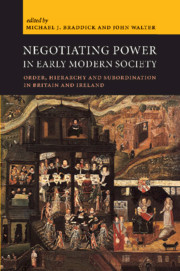Book contents
- Frontmatter
- Contents
- Notes on contributors
- Acknowledgements
- List of abbreviations and conventions
- Introduction. Grids of power: order, hierarchy and subordination in early modern society
- 1 Ordering the body: illegitimacy and female authority in seventeenth-century England
- 2 Child sexual abuse in early modern England
- 3 Sex, social relations and the law in seventeenth- and eighteenth-century London
- 4 Exhortation and entitlement: negotiating inequality in English rural communities, 1550–1650
- 5 Public transcripts, popular agency and the politics of subsistence in early modern England
- 6 ‘Bragging and daring words’: honour, property and the symbolism of the hunt in Stowe, 1590–1642
- 7 Administrative performance: the representation of political authority in early modern England
- 8 Negotiating order in early seventeenth-century Ireland
- 9 Order, orthodoxy and resistance: the ambiguous legacy of English puritanism or just how moderate was Stephen Denison?
- 10 Making orthodoxy in late Restoration England: the trials of Edmund Hickeringill, 1662–1710
- Notes
- Index
3 - Sex, social relations and the law in seventeenth- and eighteenth-century London
Published online by Cambridge University Press: 13 March 2010
- Frontmatter
- Contents
- Notes on contributors
- Acknowledgements
- List of abbreviations and conventions
- Introduction. Grids of power: order, hierarchy and subordination in early modern society
- 1 Ordering the body: illegitimacy and female authority in seventeenth-century England
- 2 Child sexual abuse in early modern England
- 3 Sex, social relations and the law in seventeenth- and eighteenth-century London
- 4 Exhortation and entitlement: negotiating inequality in English rural communities, 1550–1650
- 5 Public transcripts, popular agency and the politics of subsistence in early modern England
- 6 ‘Bragging and daring words’: honour, property and the symbolism of the hunt in Stowe, 1590–1642
- 7 Administrative performance: the representation of political authority in early modern England
- 8 Negotiating order in early seventeenth-century Ireland
- 9 Order, orthodoxy and resistance: the ambiguous legacy of English puritanism or just how moderate was Stephen Denison?
- 10 Making orthodoxy in late Restoration England: the trials of Edmund Hickeringill, 1662–1710
- Notes
- Index
Summary
By the beginning of the seventeenth century, the public regulation of sexual behaviour had been a central feature of English society for many hundreds of years. It was generally agreed that sexual immorality was deeply disruptive of social and political order, that it had disastrous economic consequences, and that leaving it unpun-ished would provoke the wrath of God upon the whole community. For all these reasons, sexual activity outside marriage was prohibited, and anyone who abetted or engaged in such behaviour was liable to prosecution. The main jurisdiction over sexual offences was exercised by the church courts, which could impose shaming punishments (sometimes commutable into a fine) and various forms of excommunication. But there were also, especially in towns, many secular jurisdictions that punished adulterers, fornicators, whores and bawds, usually through a combination of fining, imprisonment, whipping and public humiliation.
As is now widely appreciated, the study of these matters can reveal a great deal about early modern society. It tells us much about how men and women understood the world they lived in, about the practical significance of their religious beliefs, and about how they perceived the relationship between individual and communal norms and spheres of responsibility. No less importantly, it elucidates the workings, and the broader social role, of the law, that bulwark of contemporary equity and order. And because both ecclesiastical and secular measures against sexual immorality were strongly rooted in ideals of consensus, and the practice of legal regulation depended heavily upon the involvement of ordinary householders, studying it has shed much light upon the texture of neighbourhood life in the small-scale towns and villages of which most of England consisted.
- Type
- Chapter
- Information
- Negotiating Power in Early Modern SocietyOrder, Hierarchy and Subordination in Britain and Ireland, pp. 85 - 101Publisher: Cambridge University PressPrint publication year: 2001
- 2
- Cited by



